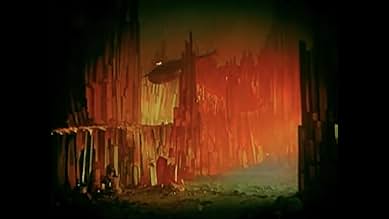After three years MGM finally completed and released The Mysterious Island in 1929 with sound grafted into the film. Though the grafting is rather evident it doesn't take away from the film itself and the enjoyment thereof.
This could easily have been a disaster for MGM. In their first two years the production costs of Ben-Hur and The Big Parade had the top brass worried. Fortunately both proved to be box office smashes and insured the survival of the studio. The Mysterious Island had that kind of ambition behind it and didn't do as well as those two classics, but by that time MGM's survival was guaranteed.
Apparently just as they were about to release it, sound was gaining more popularity and it was decided to add some dialog and sound effects. In a book about the Barrymore family Louis B. Mayer thanked whatever Gods he worshiped that the hero and villain of his film, Lionel Barrymore and Montagu Love were both theatrically trained players with marvelous speaking voices.
In fact one of the great things about the film is that the longest sequence with dialog is right at the beginning and it's between Barrymore and Love and it sets the stage for the whole film. In 1929 just about every film had overacting in it as players were getting used to sound. But there's not a trace of it in this sequence as both of these veterans by instinct knew how to handle the microphone.
MGM had a lot of shooting problems getting the special effects right, but for their time what came out was pretty darn good.
What they didn't do is use any part of Jules Verne's book other than the title. Barrymore is both a member of the nobility and a scientist who lives and works on his own island off the coast of some Balkan country. His island is a dead volcano the peasants all work for Barrymore in his experiments, but hardly in the same way they did for Dracula or Frankenstein. Montagu Love is another noble who has ambitions to take over the kingdom and would love to get his hands on the prototype deep sea submarine that Barrymore is constructing. He does of course and Barrymore gives chase down to the depths where they encounter a host of underwater marvels including giant sea creatures and a race of men who've developed just as man has in the deep ocean.
This early attempt at science fiction is a landmark film and deserves to be recognized as such. Though Jules Verne wouldn't have recognized his story, the film is still a good one and even the obvious grafting of sound and dialog on the film doesn't hamper it's entertainment value in the least.

































